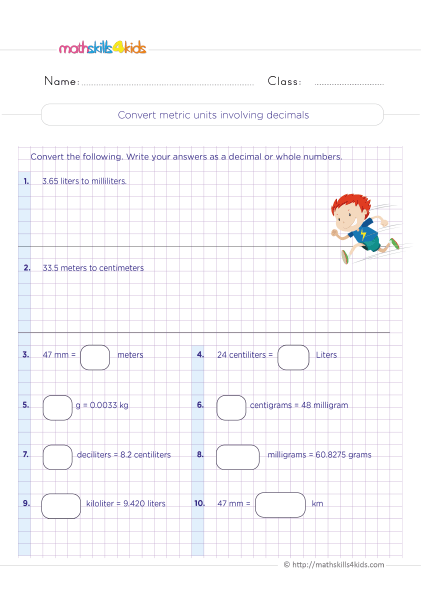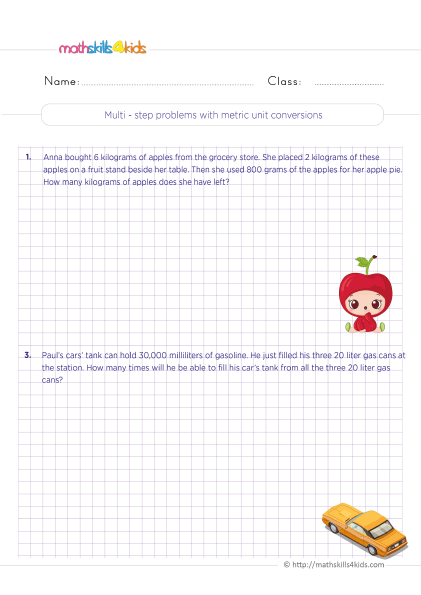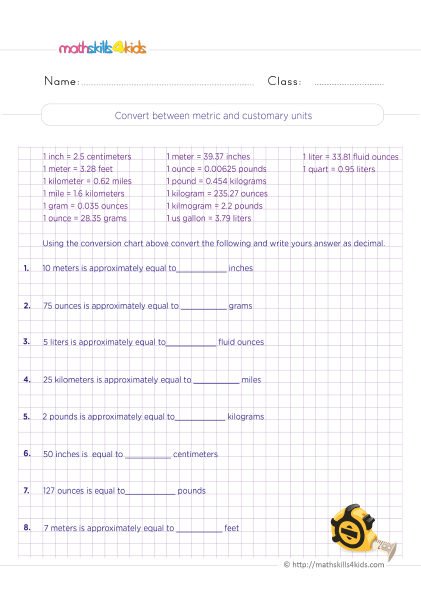Grade 5 measurement worksheets: Customary and metric conversion
Are you ready to take your measurement skills to the next level? In Grade 5, students are introduced to the fascinating world of converting customary and metric units, and what better way to perfect these skills than with our comprehensive collection of Grade 5 measurement worksheets?
-
Below is a guideline of all that we have for you in this article:
- The importance of measurement in grade 5 math
- Understanding conversion between customary and metric units
- Grade 5 measurement worksheets: Customary to metric conversion
- Grade 5 measurement worksheets: Metric to customary conversion
- Tips for practicing measurement conversion
- Common mistakes to avoid in measurement conversion
- Additional resources for grade 5 measurement worksheets
- Incorporating measurement practice into everyday activities
- Conclusion: Mastering measurement conversion in grade 5 math
From customary to metric units: Grade 5 measurement worksheets for perfecting conversion
From customary to metric units, Mathskills4kids.com has the best Grade 5 measurement worksheets noted for perfecting conversion skills in students.
Whether you're a teacher looking to enhance your lesson plans or a parent wanting to support your child's learning at home, these carefully crafted worksheets are designed to engage your students and challenge them like never before.
From converting inches to centimeters, pounds to kilograms, or even miles to kilometers, our worksheets cover a wide range of conversion scenarios, ensuring that students gain a solid understanding of both customary and metric units.
To transform conversion challenges into confident triumphs, our Grade 5 measurement worksheets will provide engaging exercises with clear explanations and plenty of practice opportunities.
-
BROWSE THE WEBSITE
-
DOWNLOAD FREE WORKSHEETS
-
-
5th GRADE MATH TOPICS
- Number sense
- Addition and subtraction
- Multiplication
- Division
- Exponents
- Number theory
- Decimals
- Add & subtract decimals
- Multiply decimals
- Divide decimals
- Fractions & mixed numbers
- Add & subtract fractions
- Multiply fractions
- Divide fractions
- Mixed operations
- Problems solving
- Ratios and rates
- Percentages
- Money Math
- Number sequences
- Coordinate graph
- Variable expressions
- Data and Graphs
- Probability and statistics
- Telling time
- Unit of measurements
- 2D figures
- Triangles & quadrilaterals
- Symmetry & transformations
- 3D figures
- Geometric measurements
-
-
Comparing and converting customary units of length
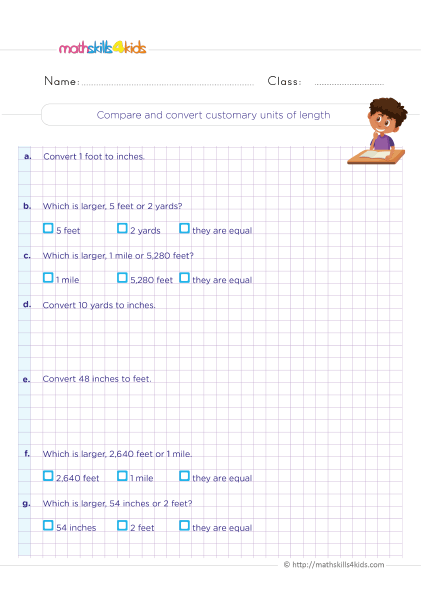 Print it...
Print it...
-
Compare and convert customary units of volume practice
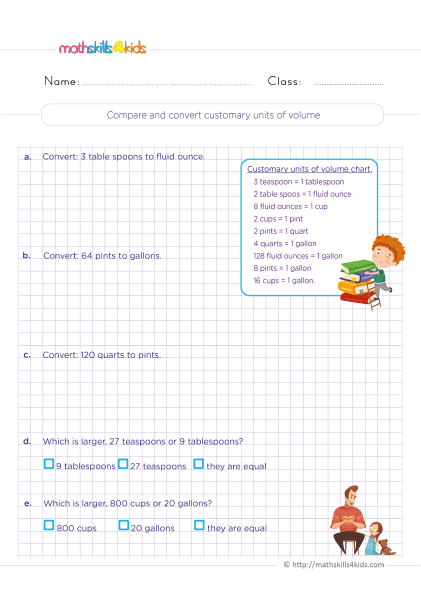 Print it...
Print it...
-
Measurement and convertion table of customary units
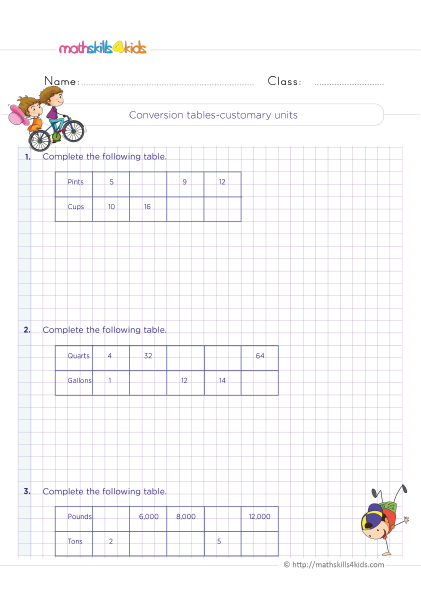 Print it...
Print it...
-
Converting customary units involving fractions
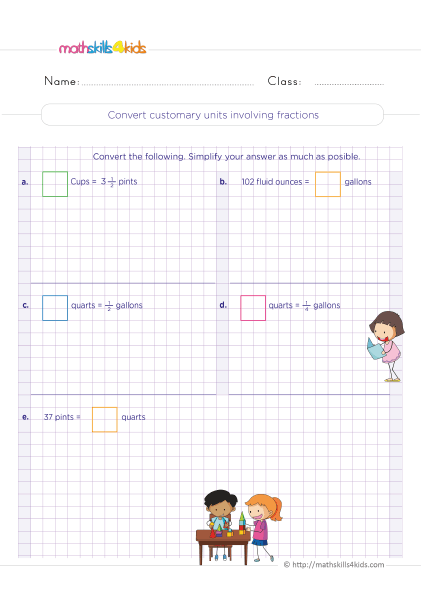 Print it...
Print it...
-
How do you convert mixed customary units
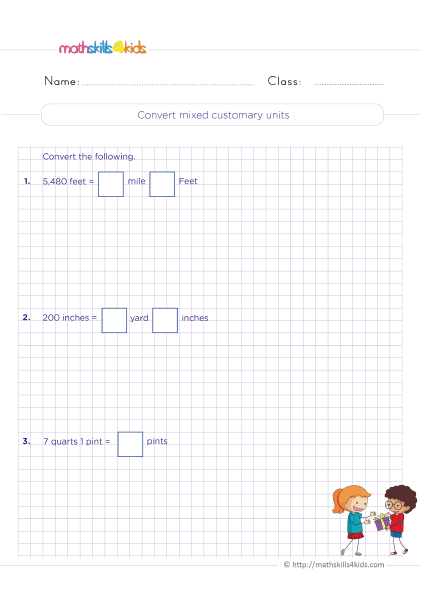 Print it...
Print it...
-
Choosing appropriate units measure practice
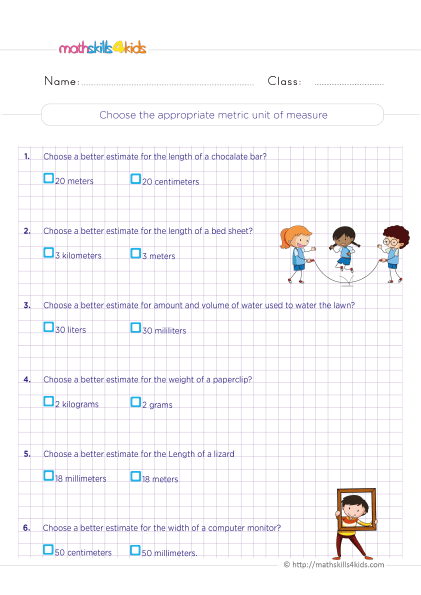 Print it...
Print it...
-
Comparing and converting customary units of length
-
Buying is supporting us!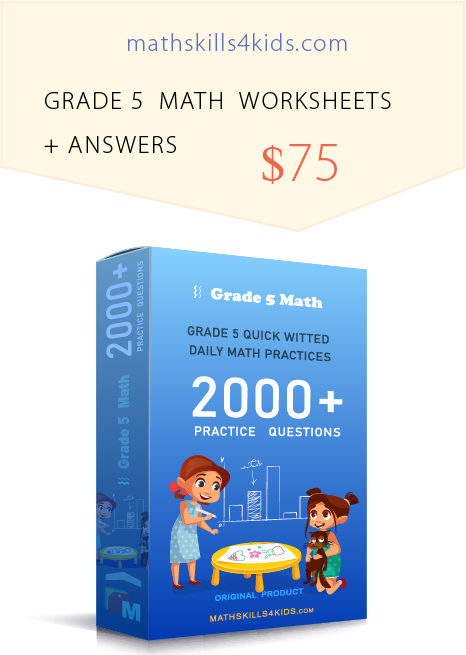
Buy Now...
-
-
The importance of measurement in Grade 5 Math
Measurement is a fundamental concept in mathematics and plays a crucial role in our daily lives. In grade 5, students delve deeper into the world of measurement, building upon the knowledge they acquired in previous grades. This is a critical stage where students transition from simple measurements to more complex concepts, such as converting between customary and metric units.
Understanding measurement in Grade 5 is essential because it allows students to make sense of the world around them. Whether measuring ingredients for a recipe, calculating distances between two points, or estimating the weight of an object, measurement is involved in various aspects of our day-to-day activities.
By mastering measurement skills, students develop a practical understanding of the world and build a strong foundation for future math concepts.
-
Understanding conversion between customary and metric units
One of the critical objectives in grade 5 math is to develop an understanding of conversion between customary and metric units. Customary units are commonly used in the United States, while metric units are used worldwide. The ability to convert between these two systems is a valuable skill that enables students to communicate and compare measurements effectively.
To understand conversion, students need to be familiar with the basic units of measurement in both systems. In the customary system, these units include inches, feet, yards, miles, ounces, pounds, and tons.
On the other hand, the metric system uses millimeters, centimeters, meters, kilometers, grams, kilograms, and metric tons. Students can easily convert measurements from one system to another by understanding the relationship between these units.
-
Grade 5 measurement worksheets: Customary to metric conversion
Mathskills4kids’ Grade 5 measurement worksheets cover various conversion scenarios, from customary to metric conversion. These worksheets give students ample practice opportunities and clear explanations of the conversion process.
Won’t you be glad to see your kids display mastery of conversion skills in various scenarios? Mathskills4kids’ customary to metric conversion worksheets have all to offer. For example, Students might be asked to convert inches to centimeters, feet to meters, or pounds to kilograms. Each worksheet includes multiple exercises, allowing students to reinforce their understanding of the conversion process.
To further ensure a smooth learning experience, our worksheets offer simple steps to convert from customary to metric units. Students will learn the conversion factors for each unit and practice applying these factors to solve conversion problems.
With consistent practice, students will develop the confidence and fluency needed to convert measurements effortlessly.
-
Grade 5 measurement worksheets: Metric to customary conversion
In addition to customary to-metric conversion, our Grade 5 measurement worksheets cover metric-to-customary conversion. These worksheets comprehensively explore the relationship between metric and customary units, allowing students to deepen their understanding of both systems.
In the metric to customary conversion worksheets, students will encounter conversion scenarios such as centimeters to inches, meters to feet, or kilograms to pounds.
Just like the customary to metric conversion worksheets, these worksheets provide step-by-step explanations and ample practice opportunities.
Students will strengthen their understanding of the relationship between units in both systems by practicing metric to customary conversion. Also, they will become proficient in converting measurements from metric to customary units and vice versa, preparing them for real-world applications where both systems are used interchangeably.
-
Tips for practicing measurement conversion
Mastering measurement conversion requires consistent practice and engagement. Here are some tips to help students make the most of their Grade 5 measurement worksheets:
- Read the instructions carefully: Ensure your students understand what is being asked before attempting to solve the problem. They must pay attention to the units provided and required for the conversion.
- Use conversion factors: Encourage your 5th graders to memorize the conversion factors for commonly used units. These factors act as a bridge between customary and metric units and simplify the conversion process.
- Show your work: When solving conversion problems, ask learners to show their work step by step. This will help you identify any mistakes they’ve made and clearly explain them.
- Practice regularly: Tell your 5th graders to set aside time for practicing measurement conversion. Regular practice will reinforce their understanding and improve their speed and accuracy.
- Seek help when needed: If your students struggle with a particular concept or conversion, let them not hesitate to seek help from you or a knowledgeable adult. This is because understanding the underlying principles will make conversion easier.
By following these tips and utilizing grade 5 measurement worksheets from Mathskills4kids.com, students will build a strong foundation in measurement conversion and develop the skills necessary for success in grade 5 math and beyond.
-
Common mistakes to avoid in measurement conversion
While learning measurement conversion, students may encounter common pitfalls. Here are a few mistakes to watch out for and avoid:
- Mixing up conversion factors: Students must ensure they use the correct conversion factor for the unit they are converting. Mixing up conversion factors can lead to incorrect answers.
- Forgetting to cancel units: When performing a conversion, it's important to cancel out units that appear in the numerator and denominator. Failing to cancel units can result in incorrect conversions.
- Rounding errors: Students should also be mindful of rounding errors when converting between units. They should round at the appropriate step in the conversion process to maintain accuracy.
- Misinterpreting units: Remind them to pay close attention to the units provided in the problem and the units required for the conversion. Misinterpreting units can lead to incorrect conversions and answers.
By being aware of these common mistakes and practicing diligently, students can avoid them and become confident in their ability to convert measurements accurately.
-
Incorporating measurement practice into everyday activities
Measurement is not limited to the classroom. There are numerous opportunities to incorporate measurement practice into everyday activities. By engaging in measurement activities outside of formal lessons, students can further solidify their understanding of measurement concepts and develop a deeper appreciation for the relevance of measurement in their lives.
Please encourage students to measure ingredients while cooking, estimate distances when traveling, or calculate the area of their room. These activities provide practical measurement applications and allow students to see the direct connection between what they learn in the classroom and the world around them.
Bonus: Additional resources for Grade 5 measurement worksheets
In addition to Mathskills4kids’ collection of Grade 5 measurement worksheets, several other resources can further support students' learning and understanding of measurement conversion. Here are some websites that offer free worksheets and activities on various topics related to measurement:
- Math-Drills.com: This website has a large collection of measurement worksheets for grade 5, covering topics such as length, weight, volume, area, perimeter, angles, and more. You can choose the difficulty level, the measurement units, and the type of problems you want to practice. https://www.math-drills.com/measurement.php.
- K5 Learning: This website offers printable measurement worksheets for grade 5 and online interactive quizzes and games. You can practice converting between different units of measurement, estimating and measuring length, weight, and capacity, and solving word problems involving measurement. https://www.k5learning.com/free-math-worksheets/fifth-grade-5/measurement.
- com: This website provides fun and engaging measurement activities for grade 5, such as making a ruler, measuring shadows, creating a scale model, and more. You can also find worksheets, games, and videos on measurement topics for grade 5. https://www.education.com/activity/fifth-grade/measurement/.
By utilizing a combination of worksheets, online resources, interactive games, and real-world applications, students can reinforce their understanding of measurement conversion and develop a well-rounded skill set.
-
-
Thank you for sharing the links of MathSkills4Kids.com with your loved ones. Your choice is greatly appreciated.
Conclusion
Measurement conversion is a crucial skill that students in grade 5 must master to succeed in mathematics and everyday life. Mathskills4kids’ comprehensive collection of Grade 5 measurement worksheets provides the perfect platform for students to practice and perfect their customary and metric conversion skills.
So, whether you're a teacher looking to enhance your lesson plans or a parent wanting to support your child's learning at home, our Grade 5 measurement worksheets are the perfect resource to take your 5th grader's measurement skills to the next level.
